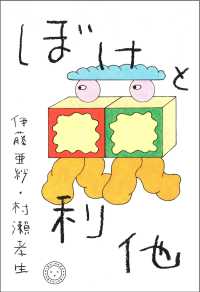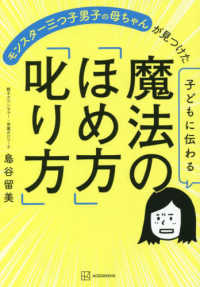- ホーム
- > 洋書
- > 英文書
- > Literary Criticism
Full Description
Mystic Moderns examines the responses of three British authors—Evelyn Underhill (1875-1941), May Sinclair (1863-1946), and Mary Webb (1881-1927)—to the emerging modernity of the long early twentieth-century moment encompassing the First World War. As they explored divergent but overlapping understandings of what mystical experience might be, these authors rejected claims that modernity's celebration of the secular and rational left no place for the mystical; rather, they countered, sensitivity to a greater reality could both establish and validate personal agency, and was integral to their identities as modern women. Their preoccupations with the dynamism of human connection drew on prevailing ideas of "vital energy" or "life force" developed by Arthur Schopenhauer and Henri Bergson in ways that channeled modernity's erotic energy of change. By using their fiction to describe new, self-authenticating forms of mysticism separate from either the prevailing orthodoxy of establishment Christianity or the extreme heterodoxy of their era's enthusiasm for paranormal experimentation, they also contributed to the rise of a generic concept of "spirituality." Mystic Moderns thus offers historical perspective on contemporary claims for self-constructed, non-institutional spiritual experience associated with the claim "I'm spiritual, not religious."
Working as they did within the shadow of the First World War, Underhill, Sinclair, and Webb were, in the end, attempting to determine what might be of authentic value for a modern age marked by ubiquitous death. While not themselves utopian authors, each was touched by her era's complicated hunger for the best of all possible worlds. Their constructions of how an individual should be and act in the midst of modernity thus simultaneously projected visions of what that modernity itself should become.
Contents
Introduction: Agencies and Innovations
Chapter One: Considering the New: "modern," "modernity," and "modernism"
Part One: Evelyn Underhill's Heroic Mysticism
Chapter Two: Mystic Modes: Living, Dying, Knowing
Chapter Three: Catholic Aesthetics and Medieval Modernity
Chapter Four: Magics and Mysticisms: Finding a New Orthodoxy
Chapter Five: The Heroic Individual on the Mystic Way
Chapter Six: Gender, Class, and Mysticism
Part Two: May Sinclair's Erotic Mysticism
Chapter Seven: Language and the Lure of Idealism
Chapter Eight: Deepest Desires: Embracing Erotic Mysticism
Chapter Nine: Maintaining Control: Will and the Boundaries of Self
Chapter Ten: Evolution's Promise: Consciousness, Species, Religion
Chapter Eleven: Modernity, War, and Death: Mystic Responses
Chapter Twelve: Meeting the Dead: Ghost Stories for Moderns
Part Three: Mary Webb's Mysticism of Nature
Chapter Thirteen: Country Living: Tales of Old and New
Chapter Fourteen: Agency and Choice: Romanticism, Mysticism, Capitalism
Chapter Fifteen: Acting Naturally: Christianity, Sexuality, Agency
Chapter Sixteen: Other Ways to Think?: The Puzzle of a Medieval Turn
Conclusion: Connections and Crossings








